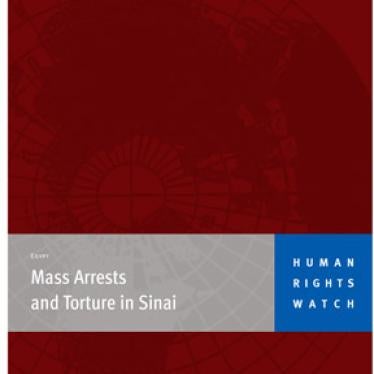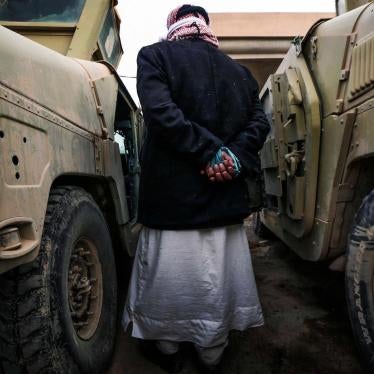(Cairo, February 22, 2005) The Egyptian state security forces arbitrarily arrested thousands of people and tortured detainees in the wake of the Taba Hilton bombing in October, Human Rights Watch said in a report released today. Four months later, as many as 2,400 detainees are still being held incommunicado.
The 48 page report, "Mass Arrests and Torture in Sinai," documents how, in the weeks and months after the bombing that killed 30 people in the resort town of Taba, the State Security Investigation agency conducted mass arrests in northern Sinai without a warrant or judicial order as required by Egyptian law.
The Egyptian authorities have identified only nine suspects as responsible for the Taba attack, but the ministry of interior continues to hold an estimated 2,400 detainees. The government has not released information on the whereabouts of these detainees either to their families or lawyers representing them, and has not indicated if any have been charged with crimes.
"Egyptian security forces responded to the Taba atrocity by committing mass human rights abuses themselves," said Joe Stork, Washington director of Human Rights Watch's Middle East and North Africa Division. "The Mubarak government still hasn't gotten the message that routine torture and arbitrary arrests violate the law and fail to address real security needs."
Human Rights Watch conducted this investigation in northern Sinai with two Egyptian human rights organizations, the Hisham Mubarak Law Center and the Egyptian Association against Torture.
The authorities have not contested the claims of Egyptian human rights organizations that security forces rounded up between 2,500 and 3,000 persons following the bombing. On February 4 the interior ministry announced the release of some 90 detainees, adding that further releases would follow.
Released detainees and families of those detained told Human Rights Watch that those arrested were first held and interrogated at SSI headquarters in el-Arish. The authorities then released some but transferred most to prisons in Cairo and the Nile Delta.
On October 25, the interior ministry identified the alleged ringleader of the Taba Hilton attack, who was killed in the blast, as a petty criminal of Palestinian origin who had recently "turned to religious extremism." He staged the bombing, the ministry said in a statement, because he was upset by Israeli army actions against Palestinians in the Gaza Strip. Located on the Israeli-Egyptian border, the Taba Hilton is especially popular with Israeli vacationers.
"If Egypt won't bring criminal charges against these detainees and give them fair trials, it must promptly release them," Stork said.
Human Rights Watch urged the Egyptian government to conduct a thorough and impartial inquiry into allegations of torture and arbitrary arrest, prosecute any officials found to have violated the law, and ensure that persons arrested illegally and subjected to torture have access to prompt and fair compensation.
Government officials in el-Arish and Cairo were unwilling to meet to discuss the arbitrary arrests and torture allegations while it was conducting its investigation, Human Rights Watch said. A subsequent letter of inquiry to Egyptian Interior Minister Habib el-Adli has also gone unanswered.
Human Rights Watch also called on the Egyptian People's Assembly to conduct an impartial public inquiry into charges of widespread arbitrary arrests and detention and allegations of torture and ill-treatment in connection with investigations into the Taba bombing.







